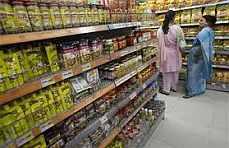 | « Back to article | Print this article |
Economists at the Centre for Economic and Social Studies (CESS) here expect that the share of organised retail in India will not exceed 30 per cent of the total retail trade in the country even after allowing 51 per cent foreign direct investment in (FDI) in multi-brand retail. "Studies based on international experience reveal that the organised retail trade, at best, can capture 25-30 per cent share of the total retail trade," according to R Radhakrishna, president of Indian Society of Agricultural Marketing (ISAM) and honorary professor of CESS.
"Studies based on international experience reveal that the organised retail trade, at best, can capture 25-30 per cent share of the total retail trade," according to R Radhakrishna, president of Indian Society of Agricultural Marketing (ISAM) and honorary professor of CESS.
CESS director Manoj Panda and faculty members, N Chandrasekhar Rao and Venkat Reddy, besides Kiranmayi of the Institute of Public Enterprise (IPE) concurred with the views of Radhakrishna.
On the other hand, S Galab, also of CESS, pointed out that FDI in retail exceeded 30 per cent of the market share in countries like Thailand and Malaysia.
However, the other economists said this would not be the case in the country. Indian consumer's general preference for products would confine the market share of organised retail in food and groceries to under 20 per cent.
Worldwide, 85 per cent of the sales of supermarkets is in processed and semi-processed products . Only 15